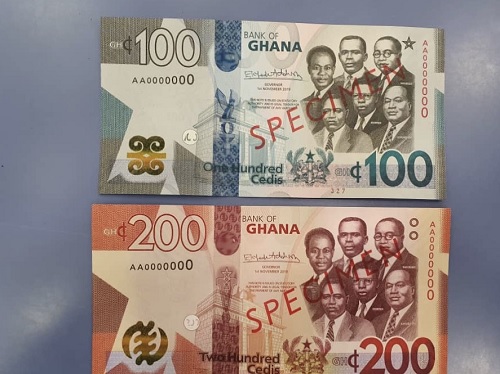
Strengthening the Ghana Cedi
Ghana now has GHc100 and GH¢200 banknotes in circulation to complement the existing series of the country’s currencies.
The Bank of Ghana (BoG), which introduced the new notes, also introduced the new GH¢2 coin to reduce the cost of printing currencies.
According to the BoG, the higher banknotes were to complement the existing high denomination banknotes to ease high-value transaction. However, the GH¢200, which will be introduced gradually into circulation, will be in limited quantities.
Since the introduction of the new notes, opinions on them have been divided. While some financial experts think it is a great move which will reduce the volume of money carried around to transact business, others opine that it could trigger inflation and make the economy worse off.
This is because in the past the introduction of new banknotes resulted in higher levels of inflation and currency depreciation, a development which has eroded some of the gains of the redenomination done in July 2007.
For us at the Daily Graphic, the deadweight, which is the burden of carrying large volumes of currencies, which is reflected in high transaction cost, seems to have re-emerged, and for this reason this set of higher denominations is expected to address increased transaction costs, especially in high-value transactions in a cash-based economy.
Again, it appears the structure of banknotes denomination has changed, resulting in a shift in demand for higher denominations. Indeed, the GH¢50 and GH¢20 notes account for about 70 per cent of the total demand, reflecting the expansion in income and prices.
It is in the light of this that the Daily Graphic trusts that the introduction of higher value denominations is necessary to ensure customer convenience, a reduction in the cost of printing and other currency management processes.
Our worry, however, is that if the necessary structures are not put in place, it can trigger the fundamental problems of high inflation and perennial currency depreciation which we are striving to avoid.
We, therefore, entreat the BoG to, as a matter of importance, put in place the necessary pragmatic measures that will address these fundamental issues because if they are not addressed, the country could introduce yet another set of higher denominations in the next decade.
As managers of the monetary aspect of the economy, we expect the BoG to continue to monitor inflationary trends to ensure a low level of inflation.
We note the various policies that have been put in place in recent times to ensure productivity and employment creation, and it is our hope that duty bearers who have been charged with the execution of these programmes will put in their maximum effort to ensure that we boost the performance of the economy, so that the higher banknotes do not lose their essence.
This is because a higher currency liquidity, without the corresponding productivity, could translate into more money chasing few goods, resulting in the loss of value for the currency notes.
We have not lost sight of the structure of our economy, such that people's psyche is to naturally discount the value of smaller denominations. For this, we think there must be a conscious, sustained national campaign to make people accept our smaller denominations.
The trend in the country is that every higher denomination introduced moves transactions and accounting broadly away from smaller denominations in favour
of the higher denominations.
To forestall this challenge, we urge the BoG to pursue financial inclusion by accelerating the migration to e-payment platforms to enhance the growth in digital payments.
Be it as it may, the new denominations have come into circulation and we call for rigorous nationwide educational campaigns focused on the security features to prevent unscrupulous persons from taking advantage to introduce fake ones into the system.
We must also not forget to let the people appreciate the proper handling of banknotes and usage of coins to prolong the circulation life of the currencies to help the economy in general.

 Click the link to read your copy.
Click the link to read your copy.